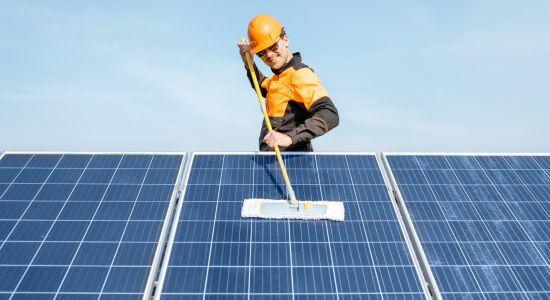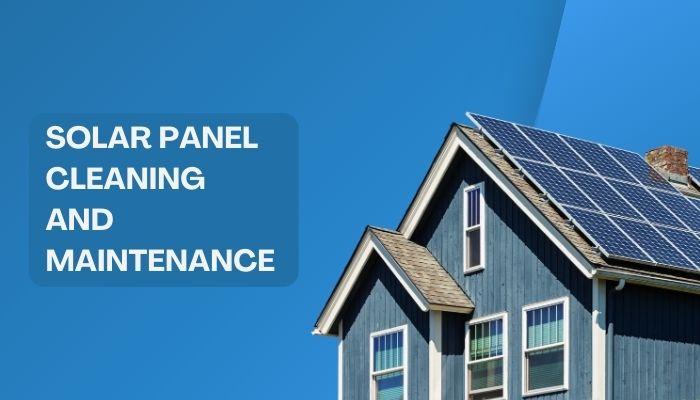Solar panels are a valuable, sustainable improvement to your home, but if they are not cleaned and you can’t regularly obtain solar panel cleaning, you are not doing much with them. Dust, dirt, bird feces, and pollen collect on the panels, blocking sun absorption, which drops energy production by as much as 20%. If you are not cleaning your panels, you are not getting all the revenue you have already paid for producing power from the renewable system.
Operational cleaning enhances power generation and extends the life of your solar panels. Whether you opt for do-it-yourself measures or professional solar panel cleaning services, staying on top of maintenance is necessary.
Smart Tips for Solar Panel Cleaning and Maintenance

Here are seven easy and effective methods so you can clean/service/maintain your solar panels like a pro:
1. Clean Your Solar Panels During Cool Hours
It is best to clean panels early in the morning or late in the evening. In the case of cooler panels, however, the water doesn’t evaporate as fast as it should, which causes streaks and spots. Cleaning the hot panels with cold water can create thermal shock, which can crack the glass. Dew If there’s dew in the morning, it can soften dirt, making it easier to clean solar panels.
2. Invest in Quality Solar Panel Cleaning Equipment
Using the proper solar panel cleaning equipment is essential so as not to scratch or harm your panels. An effective basic kit would need to contain:
- A soft-bristled brush for scrubbing gently
- A squeegee with a plastic blade to remove water
- A long-handled extension pole for hard-to-reach panels
- A hose with a nozzle or a water-fed pole system
Do not use power washers or rough scour pads. These tools may appear successful but do more harm than good, as they can permanently damage the protective surface of the panels.
Also Read: Mobile Home Repairs: Common Problems And How To Fix Them
3. Use Mild Cleaning Solutions or Just Water
Strong chemicals can destroy the protective coating on a solar panel, reducing the amount of sunlight it can use. Clean with clean, lukewarm water or a mild solution. Specialized solar panel cleaners can also be safely used. Ensure a good rinse after washing to remove all deposits and prevent streaking.
4. Stick to a Regular Cleaning Schedule
How often you clean should vary depending on your surroundings. If you live in a dusty area or if pollution, pollen, or bird droppings are a problem, you might have to clean your panels once a month. In cleaner areas, every 3–4 months may be good enough. Keeping to a schedule also helps prevent performance slumps and lessens the load of every cleaning since there will be less buildup.
You can set up reminders on your calendar or coordinate your cleaning schedule with your home’s seasonal maintenance, such as changing air filters or inspecting your HVAC system.
5. Hire Professional Solar Panel Cleaning Services When Needed
Not everyone can reach their solar panels without risking their safety, particularly when panels are installed on a steep or high roof. When that is the case, getting solar panel cleaning services is wise. Professional solar panel cleaning services have the proper tools and safety apparel to do the job right.
When you are looking for solar panel cleaning near me, make sure that you find licensed and insured companies with good reviews. Many provide maintenance plans that include cleaning and system checks to ensure you get the most out of your solar cell investment.
6. Keep Surroundings Clean and Clear
If you have trees or bushes near your panels that shade or drop debris on them, have them trimmed regularly. Leaves, branches, and nests can quickly dirty your system, causing unnecessary energy loss. Nesting and droppings can be avoided by installing bird deterrents or mesh guards.
The cleaner and more open the area around your panels, the less they may need to be cleaned and the more sunlight they can catch.
7. Monitor Your Panels‘ Performance
Monitor energy production using your solar inverter’s monitoring app or system dashboard. If you see a sudden decrease in output, it might signal that its panels need cleaning.
Some models also notify you when efficiency drops so you can promptly meet cleaning needs. Compare pre- and post-cleaning output data to prove the difference between dirty and clean panels.
Best Tools and Equipment for Solar Panel Cleaning
The proper solar panel cleaning equipment makes the job safer, quicker, and more effective. Here are a few top picks:
- Water-fed poles: This lets you wash panels from the ground with pure water.
- Soft-bristle solar brushes: Specifically made to avoid scratching glass.
- Extension squeegees: Assist in removing excess water and soap without streaks.
- Eco-friendly detergents: Non-abrasive and biodegradable formulas made for solar panels.
Using the right solar panel cleaner protects your panels and enhances cleaning efficiency.
Also Read: Everything You Need to Know About Buying Your First Home
Mistakes to Avoid While Cleaning Your Panels
Although with the best intentions, cleaning your solar panels improperly can result in decreased efficiency or permanent damage. Read on for a list of the common pitfalls you should avoid:
1. Using Abrasive Pads or Metal Brushes
While they may work, aggressive scrubby pads are not the best idea as they may actually scratch the protective glass surface, which is not great, both aesthetically and functionally.
2. Spraying Cold Water on Hot Panels
Solar panels become hot from the sun almost immediately, and cold water applied to a hot surface can cause thermal shock, which often results in glass cracking or bending.
3. Cleaning with Hard Water
Hard water contains minerals, which can cause white streaks or residue to remain. In the long term, these mineral deposits may inhibit sunlight from being absorbed and decrease the panel’s energy output.
4. Walking Directly on the Panels
Solar panels aren’t made to be walked on. Stomping on them can cause the glass to crack or damage the internal cells, resulting in expensive repairs and replacements.
Pro Tip:
Using soft cloths, sponges, and demineralized (deionized) water, wipe down the panels when it is cooler the best times of day are the early morning or late evening.
Conclusion:
Although solar panel cleaning may seem like a small maintenance task, ensuring it’s nice and determining how long it lasts is essential. If it lasts, you have a cleaning plan and the proper solar panel cleaning equipment, and you are committed to keeping them free of things blocking performance. Your panels should continue to perform optimally for many years. It is one of the best things personally (in terms of performing well) and as an investment in green energy. Whether you like to do it yourself or would like to hire someone to do the cleaning and you can keep those panels clean.
FAQ‘s About Solar Panel Cleaning
Q1. How frequently should I clean my solar panels?
Ans: Every 1 to 3 months, depending on dust, bird droppings, and your local environment.
Q2. What is the best solar panel cleaning tool?
Ans: It is best used with a soft-bristled brush and squeegee with an extension pole that has a water-fed system created specifically for solar use.
Q3. Can I use water to clean solar panels?
Ans: Yes, fresh water is usually fine. Gentle soap is also a possibility for stubborn stains, though chemical cleaners are not recommended.
Q4. Should I hire someone to wash my solar panels?
Ans: It’s safer and more effective to hire a professional if they are on a high or steep roof or you don’t feel comfortable doing it.



